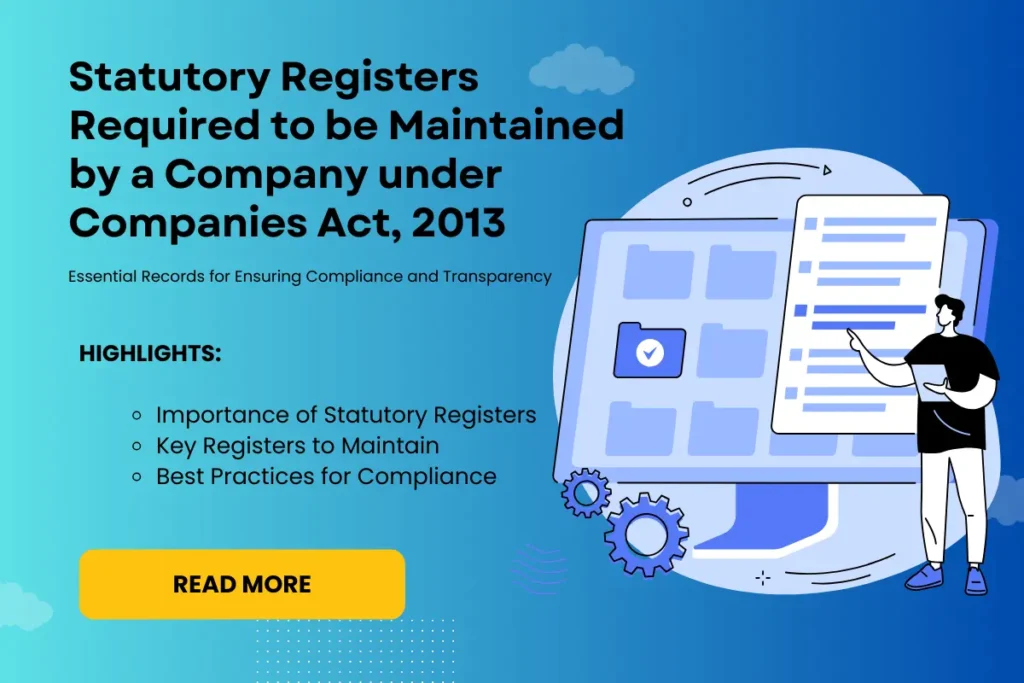Statutory Registers for Indian Companies
No. |
Section |
Subheading |
|---|---|---|
1 |
Introduction statutory registers under companies act 2013 |
Purpose of Statutory Registers |
2 |
Understanding Statutory Registers: Purpose and Importance | Transparency and Accountability, Easy Reference, Regulatory Compliance, Data Point |
3 |
Demystifying the Registers: What You Need to Maintain | Register of the Company, Register of Members, Steps to Maintain the Register of Members, Register of Directors and Key Managerial Personnel (KMP), Steps to Maintain the Register of Directors and KMP, Register of Charges, Steps to Maintain the Register of Charges, Register of Renewed and Duplicate Share Certificates, Steps to Maintain the Register of Renewed and Duplicate Share Certificates, Register of Employee Stock Options (ESOPs), Steps to Maintain the Register of Employee Stock Options Important Note |
4 |
Embracing Technology: Tools for Efficient Register Management | MCA e-filing Portal, Company Secretary Software |
5 |
Maintaining Statutory Registers: Best Practices and Beyond | Appoint a Responsible Person, Maintain Chronological Order, Retention Period, Regular Backups, Internal Audits |
6 |
Penalties for Non-Compliance: What to Avoid | Fines, Prosecution, Loss of Reputation |
7 |
Beyond the Basics: Evolving Landscape and Future Considerations | MCA Notifications, Professional Guidance, Emerging Technologies |
8 |
Advanced Considerations for Complex Business Structures | Foreign Subsidiaries, Listed Companies, Companies Raising Public Funds |
1.Introduction
Congratulations! you’ve released your dream corporation in India. Now comes the critical project of ensuring its legal and economic compliance. One key factor of that is keeping statutory registers – precise report books mandated by way of the statutory registers under companies act 2013 (the Act). these registers act as a historical record of your organization’s interest and governance, vital for internal reference, regulatory audits, and investor confidence. This weblog dives deep into the world of statutory registers, equipping you with the information to navigate them efficiently!

2. knowledge Statutory Registers: purpose and importance
Statutory registers are like company diaries, documenting essential facts approximately numerous aspects of your business. They serve several key purposes:
- 2.1 Transparency and responsibility: They provide a clear image of your organization’s possession, financial transactions, and governance practices, selling transparency for stakeholders (buyers, lenders, and many others.).
- 2.2 smooth Reference: need to do not forget past board meeting decisions or track share transfers? Registers provide a effortlessly handy historical file.
- 2.3 Regulatory Compliance: Statutory registers are crucial for demonstrating compliance with the Act all through audits or inspections performed via the Ministry of corporate Affairs (MCA). Failure to hold them can lead to consequences.
- 2.4 statistics factor: As of March 2024, over seventy four lakh corporations are registered in India. preserving proper statutory registers is important for they all.
3. Demystifying the Registers: What You need to preserve
The Act mandates the maintenance of several key registers, each serving a specific cause. let’s discover the critical ones:
- 3.1 register of the business enterprise: This register acts as the enterprise’s reliable beginning certificates, containing info just like the business enterprise name, registration number, date of incorporation, and registered workplace address.
- 3.2 sign up of members: This sign in is your business enterprise’s shareholder directory. It information the names, addresses, and folio numbers (particular identifiers) of all shareholders, along side the number of stocks held by means of each.

4. Steps to keep the check in of contributors:
- 4.1 replace the register within 7 days of any allotment, transfer, or transmission of stocks.
- 4.2 hold statistics of the date of shareholding, kind of percentage (commonplace, desire, and many others.), and the mode of acquisition (purchase, inheritance, and many others.)
- 4.3 Use form PAS-3 for recording proportion programs and form SH-four for intimations of exchange in shareholding.
- 4.4 check in of administrators and Key Managerial employees (KMP): This sign in lists all administrators and KMPs (CEO, CFO, etc.) of the corporation, statutory registers under companies act 2013 together with their names, addresses, DIN (Director identification wide variety), and nationality.
5. Steps to maintain the check in of administrators and KMP:
- 5.1 update the sign in within 30 days of any appointment, resignation, or change in details of administrators/KMPs.
- 5.2 include information in their educational qualifications, past expert revel in, and any disqualifications underneath the Act.
- 5.3 sign in of charges: This sign up statistics all safety hobbies created with the aid of the organisation on its assets (mortgages, pledges, and many others.) to relaxed loans or different liabilities.
6. Steps to hold the sign up of costs:
- 6.1 enter details of the charge, inclusive of the date, creditor’s name, quantity secured, statutory registers under companies act 2013 and the outline of the charged asset.
- 6.2 report a copy of the price file with the MCA within 30 days of its introduction.
- 6.3 register of Renewed and replica proportion certificates: This sign in files the issuance of renewed or replica percentage certificate to replace lost or damaged originals.
- 6.4 Steps to preserve the sign up of Renewed and replica share certificate:
- 6.5 record the date of difficulty, info of the authentic and alternative certificate, and the cause for replacement.
- 6.6 sign up of worker inventory alternatives (ESOPs): This check in details the company’s ESOP scheme, consisting of the eligibility criteria, choice grant info, and exercise records for each worker.
7. Steps to maintain the sign up of worker inventory alternatives:
- 7.1 long past are the days of bulky bodily ledgers. Leverage era to simplify sign up protection:
- 7.2 MCA e-filing Portal: make use of the MCA portal (https://www.mca.gov.in/content material/mca/international/en/home.html) to electronically document updates for certain registers, lowering office work.
- 7.3 business enterprise Secretary software: spend money on specialised software solutions provided by way of organizations like Vomat or BoardPAC. these automate statistics entry, generate reviews, and ensure compliance with statutory formats.
- 7.4 retaining Statutory Registers: high-quality Practices and beyond
8. Now which you’re familiar with the key registers and their maintenance steps, allow’s delve into a few fine practices for effective management:
- 8.1 hire a accountable person: Designate a specific individual (typically the organization secretary or a compliance officer) to oversee sign in upkeep and make sure timely updates.
- 8.2 preserve Chronological Order: record entries in chronological order, with clear dates and signatures for each replace. This affords a clean audit trail for destiny reference.
- 8.3 Retention duration: Statutory registers need to be preserved for a minimum period as mandated by means of the Act. as an example, the check in of members desires to be stored for the entire period of the employer’s existence. consult with a professional regarding specific retention intervals for every check in.
- 8.4 regular Backups: put in force a strong records backup machine to make certain the safekeeping of your electronic records.
- 8.5 internal Audits: behavior periodic internal audits to affirm the accuracy and completeness of information recorded in the registers.
9.consequences for Non-Compliance: What to keep away from
- 9.1 retaining statutory registers isn’t always optionally available. Failure to comply with the Act’s provisions can lead to consequences, along with:
- 9.2 Fines: The organization and its officials can be fined as much as ₹1 lakh for the primary offense and up to ₹five lakh for subsequent offenses.
- 9.3 Prosecution: critical non-compliance can result in prosecution underneath the Act, statutory registers under companies act 2013 with capacity imprisonment for company officers.
- 9.4 lack of recognition: Non-compliance can damage your organization’s reputation and deter capacity traders.

10. beyond the fundamentals: Evolving landscape and future considerations
The Indian corporate panorama is constantly evolving, with guidelines and reporting requirements statutory registers under companies act 2013 problem to alternate. here are some tips to stay ahead:
- 10.1 MCA Notifications: often screen the MCA internet site for updates, notifications, and circulars related to statutory registers and their renovation.
- 10.2 expert steering: Consulting with a qualified Chartered Accountant or business enterprise Secretary can ensure your enterprise adheres to the present day necessities and great practices.
- 10.3 emerging technology: discover how rising technology like blockchain can revolutionize report-keeping and decorate information protection for statutory registers within the future.
- 10.4 advanced issues for complex enterprise systems
- 10.5 at the same time as the previous sections protected the center aspects of statutory registers, some agencies require extra issues because of their complicated business structures. here’s a breakdown for specific scenarios:
11. overseas Subsidiaries: Indian subsidiaries of overseas agencies need to preserve extra
registers as in step with the Act and precise guidelines related to foreign direct investment (FDI). those may encompass:
- 11.1 sign up of overseas investment: This register info the foreign shareholding pattern, which includes the names, addresses, and nationality of foreign investors, at the side of the quantity of shares held.
- 11.2 sign up of branch offices: If the foreign business enterprise has established department offices in India, this register information their information together with area, cope with, and activities undertaken.
- 11.3 register of Agreements with foreign Entities: This sign in files all agreements (technical collaborations, generation transfer agreements, and many others.) entered into with the foreign determine corporation or different distant places entities.
- 11.4 indexed groups: groups listed on stock exchanges in India have additional compliance duties. They need to preserve a separate check in for “useful proprietors” who hold a tremendous hobby (extra than 10% of vote casting rights) in the organization. This check in enables sell transparency and save you insider trading.
- 11.5 companies raising Public finances: companies making plans to elevate capital thru initial Public offerings (IPOs) or follow-on public offerings (FPOs) want to conform with stringent SEBI (Securities and trade Board of India) regulations. those might involve preserving additional registers associated with investor proceedings and complaint redressal mechanisms.


